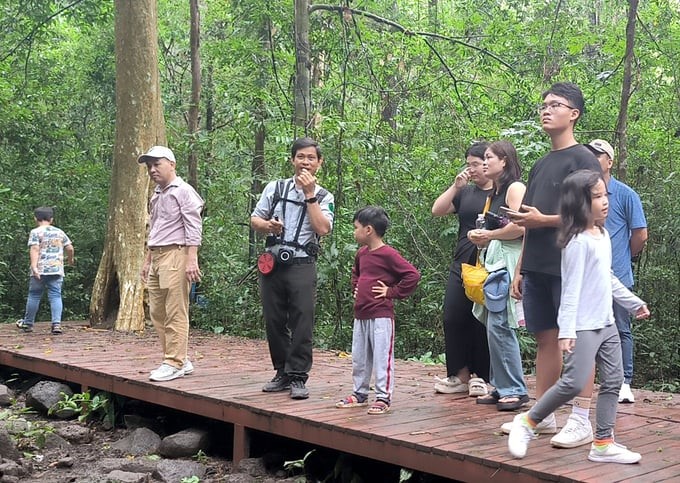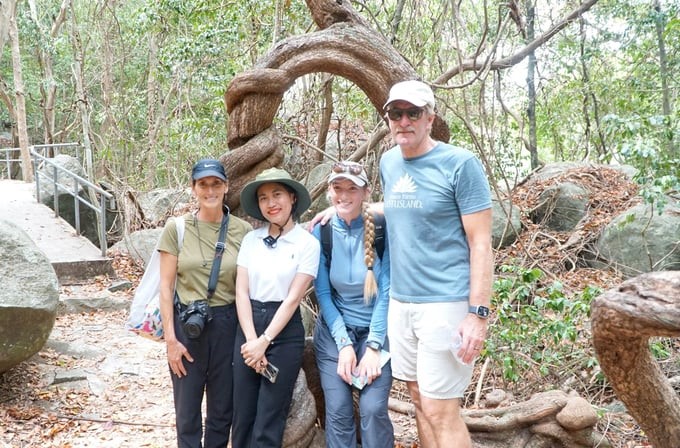June 3, 2025 | 01:41 GMT +7
June 3, 2025 | 01:41 GMT +7
Hotline: 0913.378.918
June 3, 2025 | 01:41 GMT +7
Hotline: 0913.378.918

Tourists participate in eco-tourism in Cat Tien National Park. Photo: Le Binh.
Referring to eco-tourism, Ms. Vo Thi Bich Thuy, Business Director in charge of Education and Eco-tourism Tour at Tam Anh Group, said that eco-tourism and nature tourism have similar characteristics, so many people mistakenly think that returning to the forest and nature is eco-tourism.
Meanwhile, to do eco-tourism, it is foremost compulsory to consider the destination's capacity so as not to affect nature and the environment. On that basis, the parties will design appropriate lessons, messages, and activities in the area where eco-tourism activities take place.
According to Mr. Nguyen Dinh Quoc Viet, Deputy Director of the Center for Environmental Education and Services of Cat Tien National Park, eco-tourism is a type of conditional tourism, not mass tourism. If tourists participate in other types of tourism for enjoyment and to have fun, then when participating in eco-tourism, in addition to the opportunity to experience and return to nature, tourists also have responsibility to nature and responsibility to the community in the tourist destination.
Because it is a type of conditional tourism, there must be strict management to limit negative impacts from eco-tourism. At the same time, raise tourists' awareness and understanding of eco-tourism so that tourists participating in eco-tourism in national parks and reserves can understand why certain behaviors, such as making noise or going in large groups, are restricted.
Mr. Viet said that travel companies play a very important role in selecting tourists for eco-tours in national parks and reserves. When choosing tourists who have good understanding and awareness of eco-tours, they will participate in the tour responsibly and be willing to accept restrictions at the destinations. If unsuitable tourists are chosen, they can cause harm to the environment and culture of the local community, and they themselves will not be able to feel the good and useful things from these tours.

Foreign tourists visit Con Dao National Park. Photo: Le Binh.
Therefore, to develop eco-tourism in national parks and reserves, training skills for those doing eco-tourism is very important. Eco-tourism is a specific type of tourism, so those doing eco-toursim must also have certain different skills compared to conventional tourism.
Only when being equipped with appropriate skills for eco-tourism can those doing eco-tourism implement it well and, most importantly, do it right. Because when there are many tourists, tourism workers come up with a mentality of focusing more on revenue, thereby destroying the nature or culture of local communities. When the nature or culture of a local community is damaged, it will be very difficult to recover. Therefore, it is compulsory to develop eco-tourism in a sustainable way, minimizing harm to the nature and culture of local communities.
Regarding human resource training for eco-tourism, Ms. Vo Thi Bich Thuy shared that she is a lecturer at Ho Chi Minh City University of Agriculture and Forestry. Since 2006, the school has opened a major in natural resources and eco-tourism training. To date, many alumni majoring in natural resources and eco-tourism are working in national parks and reserves.
Ms. Thuy also hopes to train more next generations to do eco-tourism, thereby promoting the potential of eco-tourism in national parks and reserves. Because skilled eco-tourism workers will know how to create tourism products from natural resources and integrate lessons and messages about forest protection and biodiversity conservation.
Ms. Vo Thi Bich Thuy, Business Director, in charge of Education and Eco-tourism Tour at Tam Anh Group, affirmed that eco-tourism is a tool to protect forests. Because eco-tourism in national parks, reserves, and forests will help tourists improve their understanding and awareness of forest protection, natural resource protection, and biodiversity conservation. Through eco-tours to national parks and reserves, tourists have received many valuable lessons from the laws of survival and ecological succession of nature, thereby understanding and loving nature more.
Once they understand and love nature through eco-tourism activities, tourists will be self-conscious and take action to contribute to protecting forests, nature, and the environment without having to be reminded. This shows that through eco-tourism activities in national parks and reserves, lessons about forest protection and natural resource protection will be received better and absorbed more deeply into each person's awareness.
Translated by Thu Huyen

(VAN) TTC AgriS and IFC signed a strategic partnership to develop a sustainable agricultural value chain, aiming to achieve the Net Zero target by 2035.

(VAN) Seafood by-products are opening a new path, combining green growth and technological innovation to enhance the industry's value.

(VAN) Mr. Nguyen Thanh Cong, Vice Chairman of the Son La Provincial People's Committee, reflects on Son La’s journey from barren hills to fruitful orchards after a decade of hard work.

(VAN) FAO’s Director-General addresses the 5th Baghdad International Water Conference.
/2025/05/26/1716-4-nongnghiep-191706.jpg)
(VAN) Chain linkages, technological innovation, and raw material zoning are three strategic pillars for the coconut industry to strongly develop and elevate its position on the global agricultural map.
![Advanced mariculture – an inevitable trend: [4] Accompanied by scientists](https://t.ex-cdn.com/nongnghiepmoitruong.vn/608w/files/sohk/2025/05/13/1941-pgsts-vo-van-nha-140958_717.jpg)
(VAN) According to Assoc. Prof. Dr. Vo Van Nha, Director of the RIA III, the development of advanced offshore mariculture is no longer an option but an essential path for Vietnam’s fisheries sector.

(VAN) Vietnam is intensifying the development of mollusk farming areas that meet international standards, aiming for sustainable growth and enhancing its export position in the global seafood market.